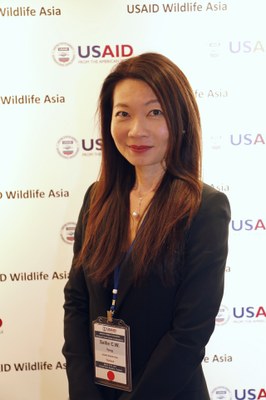Sallie Yang: International Women's Day CWT Spotlight
How did you start working in Counter Wildlife Trafficking (CWT)?
Serendipity. After 18 years as a corporate lawyer, I took a couple of years off to travel and do a post-graduate MSc in environmental management with the National University of Singapore (as a rather mature student). For my dissertation, I wanted to review the legal framework for the ASEAN region. My supervising professor tempered my ambition (thankfully) and advised me to select two countries instead as we do not have the time or resources to focus on all 10 ASEAN member states. One day, while I was still writing my dissertation, my supervising professor asked if I would like to spend four months in Bangkok to help an NGO (Freeland) to organize a regional stakeholders workshop with the ASEAN Wildlife enforcement network to develop compendium of the legal framework in the ASEAN region to combat wildlife crime. I jumped at the golden opportunity to fulfil my original wish to research the same. I packed two suitcases and left for Bangkok. Five and a half years later, I’m still with Freeland, working on legal and policy reforms on CWT in the region with the USAID Wildlife Asia program. (P.S.: the legal compendium was developed and launched in 2016, entitled “ASEAN Handbook on Legal Cooperation to Combat Wildlife Crime”).
What has been your proudest moment in CWT?
- Knowing that a paper I had helped develop on the legal framework of the ASEAN region in CWT was instrumental in Wildlife and Timber Trafficking being listed as a priority transnational crime in ASEAN at the ASEAN ministerial meeting on transnational crime.
- When ASEAN member states come up to me and said the legal compendium which I had help developed was used in the review and drafting of their wildlife laws and policies.
- The enactment of Thailand’s wildlife law which I have contributed to the review of.
- A female judge I’ve worked with wrote to tell me I was one of her inspirations to fight to protect the environment.
As a woman in CWT, how do you think we can bolster women in Counter Wildlife Trafficking? And how can we ensure greater roles for women in CWT?
We lead by example. We show them there are many important roles that women can play in CWT, then we mentor them and we must support them. Many women are already self-driven and motivated. We need to create suitable roles and a supporting system to empower women so that they can thrive. Give women roles and responsibilities, not merely tasks. Respect women. Inspire a spirit of adventure and a sense of ownership. Show women nothing is impossible if we follow our passion and principles. And most important of all, we are never too old or too late to start.


